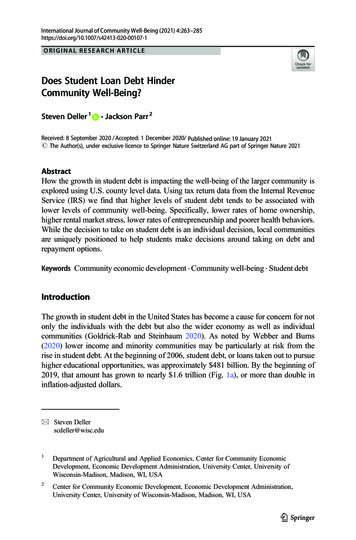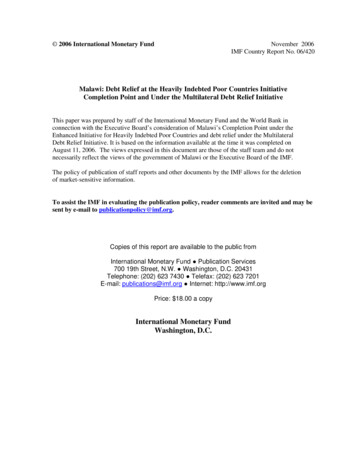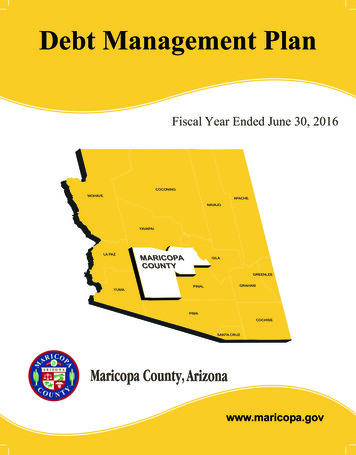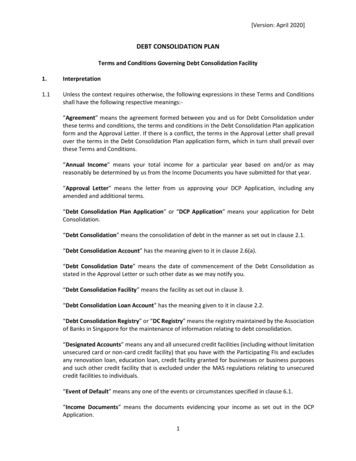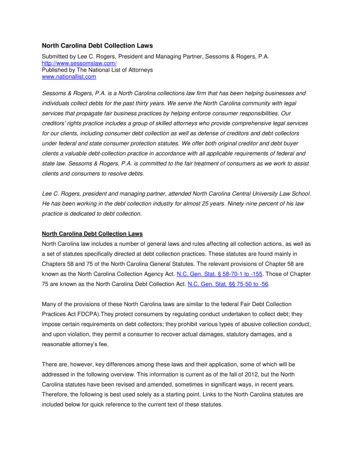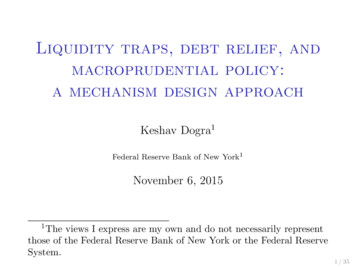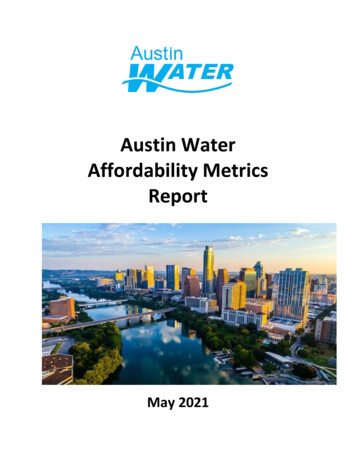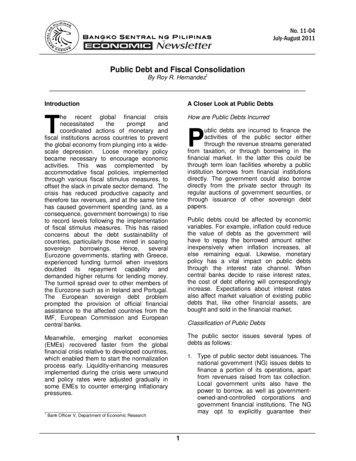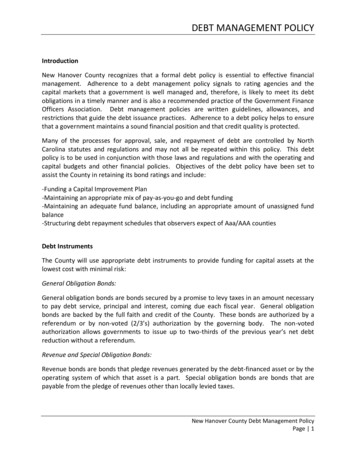
Transcription
DEBT MANAGEMENT POLICYIntroductionNew Hanover County recognizes that a formal debt policy is essential to effective financialmanagement. Adherence to a debt management policy signals to rating agencies and thecapital markets that a government is well managed and, therefore, is likely to meet its debtobligations in a timely manner and is also a recommended practice of the Government FinanceOfficers Association. Debt management policies are written guidelines, allowances, andrestrictions that guide the debt issuance practices. Adherence to a debt policy helps to ensurethat a government maintains a sound financial position and that credit quality is protected.Many of the processes for approval, sale, and repayment of debt are controlled by NorthCarolina statutes and regulations and may not all be repeated within this policy. This debtpolicy is to be used in conjunction with those laws and regulations and with the operating andcapital budgets and other financial policies. Objectives of the debt policy have been set toassist the County in retaining its bond ratings and include:-Funding a Capital Improvement Plan-Maintaining an appropriate mix of pay-as-you-go and debt funding-Maintaining an adequate fund balance, including an appropriate amount of unassigned fundbalance-Structuring debt repayment schedules that observers expect of Aaa/AAA countiesDebt InstrumentsThe County will use appropriate debt instruments to provide funding for capital assets at thelowest cost with minimal risk:General Obligation Bonds:General obligation bonds are bonds secured by a promise to levy taxes in an amount necessaryto pay debt service, principal and interest, coming due each fiscal year. General obligationbonds are backed by the full faith and credit of the County. These bonds are authorized by areferendum or by non-voted (2/3’s) authorization by the governing body. The non-votedauthorization allows governments to issue up to two-thirds of the previous year’s net debtreduction without a referendum.Revenue and Special Obligation Bonds:Revenue bonds are bonds that pledge revenues generated by the debt-financed asset or by theoperating system of which that asset is a part. Special obligation bonds are bonds that arepayable from the pledge of revenues other than locally levied taxes.New Hanover County Debt Management PolicyPage 1
DEBT MANAGEMENT POLICYOther Financing Arrangements:Installment financings are an alternative financing method that does not require voterapproval. Certificates of participation or limited obligation bonds represent an undividedinterest in the payments made by a public agency pursuant to a financing lease or aninstallment purchase agreement. The security for this financing is represented by a lien on theproperty acquired or constructed.An Installment Purchase Contract is an agreement in which the equipment or property isacquired and periodic payments, which are sufficient to pay debt service, are made. TheCounty will use this type of financing for short-term equipment purchases of 3 to 5 years.The County will use pay-as-you-go funding for capital improvements or capital assets having acost of less than 250,000 or assets having a useful life of less than 10 years unless budgetaryrestraints require the use of financing to acquire the necessary funding for those capitalimprovement or capital assets.Purposes for Debt IssuanceThe County may issue debt for the purpose of acquiring or constructing capital assets includingland, buildings, machinery, equipment, fixtures and any other eligible expenses of the projectand for making major renovations to existing capital improvements, for the good of the public.Exceptions to this rule will be considered on a case-by-case basis to determine if thecontemplated debt is in the best interests of the County. Long-term debt shall not be used tofinance ongoing operational expenses. When applicable, debt issuance will be pooled togetherto minimize issuance expense.Before issuing any new debt the County will consider the following factors:-Global, national and local financial environment and economy-Current interest rates and expected interest rate changes-Cash position and current debt position-Availability of funds to repay-Urgency of current capital needs and flexibility to cover future needs-Appropriate debt issuance practices and debt structuringDebt StructureThe debt structure is made up of the life of the debt, interest rate and principal maturityschedule. This debt could be general obligation, revenue or special obligation bonds, or otherinstallment financings. The cost of taxable debt is higher than the cost of tax-exempt debt.However, the issuance of taxable debt is mandated in some circumstances, and may allowflexibility in subsequent contracts with users or managers of the improvements constructedwith the bond proceeds. The County will usually issue obligations on a tax-exempt basis, butNew Hanover County Debt Management PolicyPage 2
DEBT MANAGEMENT POLICYmay occasionally issue taxable obligations when there is an expected benefit from doing so.The County shall establish an affordable debt level to preserve credit quality and ensuresufficient revenue is available to pay annual debt service.General obligation bonds will generally be competitively bid with no more than a 20-year lifeunless there are compelling factors which make it necessary to extend beyond this point andapplicable law allows a longer term. In a competitive sale, the County may sell its debtobligations in which any interested underwriter or syndicate is invited to submit a proposal topurchase an issue of bonds. The bonds are awarded to the underwriter presenting the best bidaccording to stipulated criteria set forth in the notice of sale.Negotiated sales or private placements, however, may be used where allowed when complexfinancing or sales structure is a concern with regard to marketability. In a negotiated sale, thebonds may be sold through an exclusive arrangement between the County and an underwriteror underwriting syndicate. At the end of successful negotiations, the issue is awarded to theunderwriters. This method offers flexibility for the County. The criteria used to select anunderwriter or syndicate in negotiated sales should include, but not be limited to the following:overall experience, marketing philosophy, capability, previous experience, underwriter’sdiscount, and expenses.The County may elect to sells its debt obligations through a private placement whenappropriate. Selection through private placement shall be determined through the Requestsfor Proposal (RFP) process.Debt service for each issue will be structured in an attempt to minimize the County’s interestpayments over the life of the issue while taking into account the existing debt obligations of theCounty. Any debt issued shall not have a maturity date beyond the useful life of the asset beingacquired or constructed by the debt proceeds.The County may also consider various financing methods including fixed or variable interestrate debt in order to minimize the interest costs over the life of the issue. The use of thesemethods will be evaluated based on market conditions and the maximum benefit to the Countywhile minimizing the County’s risk. When appropriate, the County may choose to issuesecurities that pay a rate of interest that varies according to a predetermined formula or resultsfrom a periodic remarketing of the securities or reset date determined by the bondholder. TheCounty will limit the issuance of variable rate debt to help maintain the County’s Aaa creditrating. The County’s long term variable rate debt will not exceed 15% of the total outstandinggeneral debt.Investment of bond proceeds will be consistent with those authorized by existing State law andby the County’s investment policy and applicable bond covenants. Bond proceeds shall beinvested and tracked separately from other investments.New Hanover County Debt Management PolicyPage 3
DEBT MANAGEMENT POLICYDebt RatiosThe County will use an objective, analytical approach to determine the amount of debt to beconsidered for authorization and issuance. This process involves the comparison of generallyaccepted debt ratios from comparable counties to the current County ratios. There ratios willbe re-evaluated every five (5) years or sooner as market conditions dictate.The County shall adhere to the following:Net Direct Debt per CapitaThis ratio measures the burden of direct debt placed on the population supporting the debt.This ratio is widely used by rating agencies as a measure of an issuer’s ability to repay debt. TheCounty’s general obligation debt per capita will be in line with other North Carolina countiesthat maintain an Aaa bond rating. The County will maintain per capita debt that does notexceed 2,200.Net Direct Debt as a Percentage of Assessed ValuationThis ratio measures debt levels against the property tax base that generates the tax revenues,which are the main source of debt repayment. The County will maintain its debt at no morethat 1.60% of the countywide assessed value.Net Direct Debt Service as Percentage of Operational BudgetThis ratio reflects the County’s budgetary flexibility to adapt spending levels and respond toeconomic condition changes. The County will maintain its net debt service at no more than20% of the operational budget.Ten year Payout RatioThis ratio measures how quickly the County retires it outstanding indebtedness. A higherpayout ratio preserves the County’s capacity to borrow for future capital. The County willmaintain not less than 66% for its ten-year payout.Refinancing of Outstanding DebtThe County will continually review the County’s outstanding debt and recommend issues forrefunding as market opportunities arise. Debt shall be refinanced only for the purpose ofachieving debt service savings, unless required to achieve specific debt management goals ofthe County. The estimation of net present savings should be, at a minimum, in the range of6% of the refunded maturities before a refunding process would be considered unless theCounty otherwise determines the annual savings warrants the refunding. The County will notrefinance debt for the purpose of deferring scheduled debt service, unless uniqueNew Hanover County Debt Management PolicyPage 4
DEBT MANAGEMENT POLICYcircumstances are present. The County is aware that refinancing for the purpose of deferringdebt service may have an impact on its credit rating.The County may issue advance refunding bonds when advantageous, legally permissible, andprudent and a net present value savings is achieved. Advance refunding transactions are thoseundertaken in advance of the first date the refunded debt can be called for optionalredemption, and will require an establishment of an escrow account for the defeasance of therefunded debt. All costs incurred in completing the refunding shall be taken into account whendetermining the net present value savings.The County may issue current refunding bonds when advantageous, legally permissible, andprudent and a net present value savings is achieved. Current refunding transactions shall beconsidered whenever possible. Current refunding transactions are those undertaken at or afterthe call date on outstanding debt, and provide for redemption and replacement of refundeddebt within 90 days of issuance of the refunding debt.Pay-As-You-Go FundingThe County shall use pay-as-you-go and other alternative sources of funding for capital projectsto minimize debt levels. To have an effective pay-as-you-go program, at least one fundingsource must be identified that is consistent, reliable and large enough to provide for capitalneeds in an amount that reduces dependency on debt. In order to reduce the impact of capitalprograms on future years, the County will annually appropriate funds for its capitalimprovement plan. The County will also appropriate proceeds from all county land sales andother capital assets as deemed appropriate for capital projects. This practice will allowadditional funding of capital improvement projects and reduce the County’s dependence onborrowing. Pay-as-you –go funding will save money by eliminating interest expense on thefunded projects and will improve financial flexibility in the event of sudden revenue shortfallsor emergency spending.Issuance of DebtThe scheduling and amount of bond sales and installment purchase transaction will berecommended by the Finance Director and the County Manager. The Board of CountyCommissioners must approve the sale. These decisions will be based upon the identified cashflow requirements for each project to be financed, market conditions, and other relevantfactors including debt ratios. If the cash requirements for capital projects are minimal in anygiven year, the County may choose not to issue debt but instead, the County may fund up-frontproject costs and reimburse these costs when financing is arranged. In these situations theCounty will adopt a reimbursement resolution prior to the expenditure of project funds.New Hanover County Debt Management PolicyPage 5
DEBT MANAGEMENT POLICYFixed rate general obligation bond sales are conducted on a competitive basis by the LocalGovernment Commission (LGC), a division of the Office of the State Treasurer. Variable ratebonds, revenue and special obligation bonds and Installment Financings will be sold on anegotiated basis with a selected underwriter.The County must receive an opinion acceptable to the market from a nationally recognized lawfirm that each financing transaction complies with applicable laws and all agreements inconnection with any financing are legal, valid and binding obligations of the County.Continuing DisclosureIn accordance with the Securities and Exchange Commission (SEC), Rule 15c-2-12, the Countywill provide financial and operating information to the repository or repositories designated bythe SEC. Where applicable, the County will also provide its annual financial statements andother relevant information to rating agencies, corporate trustees, and as required byContinuing Disclosure requirements within all debt documents.Arbitrage Liability ManagementThe County will maintain a system of record keeping and reporting to meet the arbitrage andrebate compliance requirements of the federal tax code. This effort includes trackinginvestment earnings on bond proceeds, calculating rebate payments in compliance with taxlaw, and remitting rebatable earnings to the federal government in a timely manner in order topreserve the tax-exempt status of the County’s outstanding debt issues.It is the County’s policy to minimize the cost of arbitrage rebate and yield restriction whilestrictly complying with the applicable laws. Because of the complexity of arbitrage rebateregulations and the severity of non-compliance penalties, arbitrage calculation will beperformed by qualified arbitrage professionals in strict adherence to applicable laws andregulations. These calculations will be done in accordance with required Internal RevenueService reporting dates.Financing TeamThe County will provide for a solicitation and selection process for securing all professionalservices required in connection with any debt issues. The service professionals selected will berequired to develop and implement the County’s debt management policy with the goal ofcontinuity, quality service and competitive prices.New Hanover County Debt Management PolicyPage 6
DEBT MANAGEMENT POLICYAdministration and ImplementationThe County Manager and the Finance Director are responsible for the administration andissuance of debt including the completion of specific tasks and responsibilities included in thispolicy.New Hanover County Debt Management PolicyPage 7
Debt management policies are written guidelines, allowances, and restrictions that guide the debt issuance practices. Adherence to a debt policy helps to ensure . -Funding a Capital Improvement Plan -Maintaining an appropriate mix of pay-as-you-go and debt funding -Maintaining an adequate fund balance, including an appropriate amount of .
